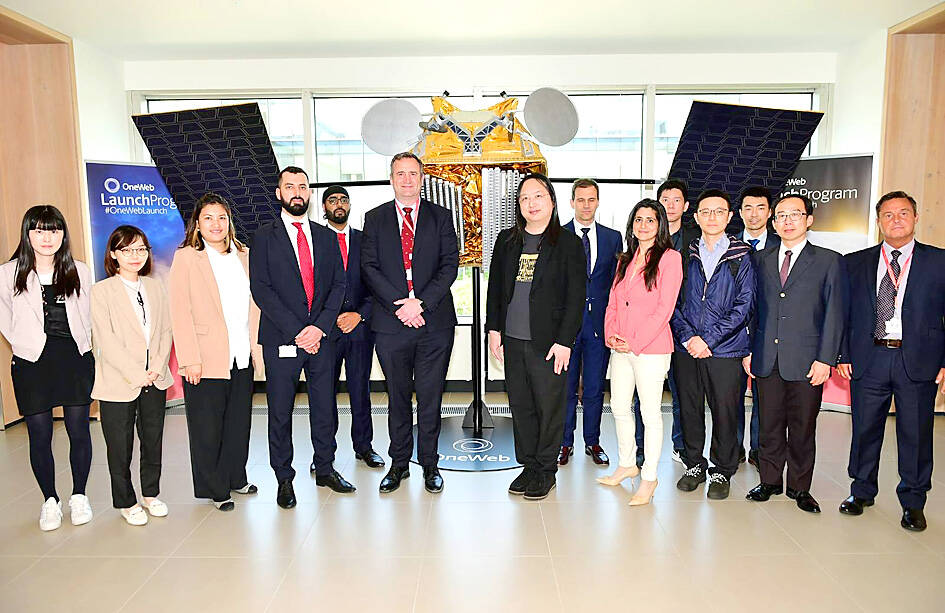The government expects satellite service by British provider OneWeb to cover all of Taiwan by the end of this year, Minister of Digital Affairs Audrey Tang (唐鳳) said.
The service expansion would provide more options for low Earth orbit (LEO) satellites to Taiwan, the Central News Agency quoted Tang as saying.
OneWeb services are currently only available in the northern part of Taiwan, said Tang, who made a rare trip to London earlier this week and visited OneWeb, which specializes in LEO satellites.

Photo courtesy of the Ministry of Digital Affairs
OneWeb, which is backed by the British government, is “very willing” to work with Taiwan to bolster Taiwan’s communication infrastructure, she said.
The government’s disaster response plan calls for the establishment of 700 satellite receivers placed across the country, the Ministry of Digital Affairs said.
Some of the receivers would be fixed and others mobile, and they would have to be configured to receive communications from multiple constellations of satellites in LEO and medium Earth orbit.
However, online commenters yesterday raised concerns, as China has invested in one of OneWeb’s owners, with some saying that working with the satellite operator would run afoul of the ministry’s own regulations.
In July last year, OneWeb announced it would merge with French Satellite operator Eutelsat, in which Beijing-run China Investment Corp (中國投資公司) has a 7 percent stake. Eutelsat’s board approved the merger in November last year, and the deal is to be finalized this year.
An official speaking on condition of anonymity said that the British government would retain a special share in OneWeb that gives London a final say over any partnership with the company or access to its technology.
As a member of the “Five Eyes” alliance with Australia, Canada, New Zealand and the US, the UK can be counted upon to be strict about its national interests and information security, the official said.
The special share is a legal mechanism that grants the government more control over OneWeb than the face value of the share would normally confer, the official said, adding that it would permit London to allow only friendly nations to be part of the company’s supply chain.
Additionally, China owns less than 5 percent of OneWeb and the company falls under the legal category of satellite operator under Taiwanese regulations, the official said.
That means rules barring collaboration with telecom companies with more than 5 percent Chinese shares do not apply to the proposal, as Internet users incorrectly suggested, they said.
The Taiwan Space Agency yesterday said that Taiwan would need more than 120 satellites to create a satellite-based Internet infrastructure, which far exceeds domestic launch capabilities.
The agency also sees no alternative than to seek help from foreign entities to launch the satellites, it said, adding that candidates for partnership would be vetted carefully in line with laws and regulations.
The agency previously said that the satellite project was a necessary measure to address the vulnerability of Taiwan’s undersea Internet cables to sabotage by China.
Additional reporting by Wu Po-hsuan

MAKING WAVES: China’s maritime militia could become a nontraditional threat in war, clogging up shipping lanes to prevent US or Japanese intervention, a report said About 1,900 Chinese ships flying flags of convenience and fishing vessels that participated in China’s military exercises around Taiwan last month and in January have been listed for monitoring, Coast Guard Administration (CGA) Deputy Director-General Hsieh Ching-chin (謝慶欽) said yesterday. Following amendments to the Commercial Port Act (商港法) and the Law of Ships (船舶法) last month, the CGA can designate possible berthing areas or deny ports of call for vessels suspected of loitering around areas where undersea cables can be accessed, Oceans Affairs Council Minister Kuan Bi-ling (管碧玲) said. The list of suspected ships, originally 300, had risen to about 1,900 as

Japan’s strategic alliance with the US would collapse if Tokyo were to turn away from a conflict in Taiwan, Japanese Prime Minister Sanae Takaichi said yesterday, but distanced herself from previous comments that suggested a possible military response in such an event. Takaichi expressed her latest views on a nationally broadcast TV program late on Monday, where an opposition party leader criticized her for igniting tensions with China with the earlier remarks. Ties between Japan and China have sunk to the worst level in years after Takaichi said in November that a hypothetical Chinese attack on Taiwan could bring about a Japanese

MORE RESPONSIBILITY: Draftees would be expected to fight alongside professional soldiers, likely requiring the transformation of some training brigades into combat units The armed forces are to start incorporating new conscripts into combined arms brigades this year to enhance combat readiness, the Executive Yuan’s latest policy report said. The new policy would affect Taiwanese men entering the military for their compulsory service, which was extended to one year under reforms by then-president Tsai Ing-wen (蔡英文) in 2022. The conscripts would be trained to operate machine guns, uncrewed aerial vehicles, anti-tank guided missile launchers and Stinger air defense systems, the report said, adding that the basic training would be lengthened to eight weeks. After basic training, conscripts would be sorted into infantry battalions that would take

DEEP-STRIKE CAPABILITY: The scenario simulated a PLA drill that turned into an assault on Taiwan’s critical infrastructure, with the launchers providing fire support Taiwan yesterday conducted this year’s first military exercises at Longsiang Base in Taichung, demonstrating the newly acquired High Mobility Artillery Rocket System’s (HIMARS) ability to provide fire support and deep-strike capabilities. The scenario simulated an attack on Penghu County, with HIMARS trucks immediately rolling into designated launch areas and firing barrages at the Wangan (望安) and Cimei (七美) islands, simulating the provision of fire support against invading forces. The HIMARS are supposed to “fire and leave,” which would significantly increase personnel and equipment survivability, a military official said. The drill simulated an exercise launched by the Chinese People’s Liberation Army (PLA) Eastern